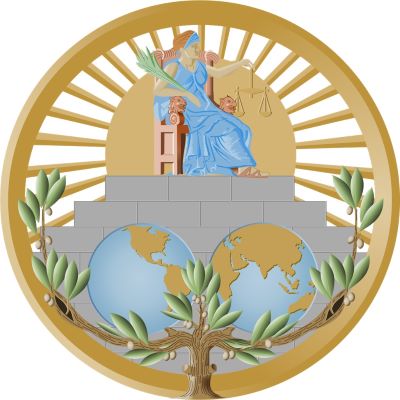Context
The International Court of Justice (ICJ), established in June 1945 as the principal judicial organ of the United Nations, plays a crucial role in settling disputes between states and providing legal opinions on matters referred by UN organs. Situated at the Peace Palace in The Hague, Netherlands, the ICJ operates under the Charter of the UN, addressing violations of international law and determining "state responsibility." Despite its significance, the court faces notable challenges, particularly in enforcing its decisions. The absence of a dedicated enforcement mechanism and the influence of power politics hinder the implementation of its legally binding judgments.
Jurisdictional Powers and Composition of the ICJ
The ICJ operates with dual jurisdictional powers: advisory and contentious. The former involves providing legal opinions on matters referred by UN entities, while the latter addresses disputes between countries, emphasizing "state responsibility" for crimes against international law. Comprising 15 judges with nine-year terms, appointed through elections at the UN General Assembly and Security Council, the court aims for impartiality. However, instances of judges aligning with their countries' politics raise concerns about the potential impact of national interests on the ICJ's objectivity. The appointment of 'ad-hoc judges' for specialized cases adds complexity to the court's composition.
Enforcement Challenges: A Barrier to Legal Authority
While ICJ decisions are legally binding and irrevocable, the court lacks an independent enforcement mechanism. The responsibility falls on the UN Security Council (UNSC), authorized by the UN Charter to enforce ICJ rulings. However, the political dynamics among permanent UNSC members often hinder the execution of adverse judgments. Notably, the U.S., a staunch ally of Israel, could veto enforcement actions against the latter. The non-participation of powerful states in ICJ proceedings, exemplified by Russia's defiance in the Ukraine case, further underscores the challenges in ensuring compliance with the court's decisions.
Procedural Criticisms: Delayed Justice and Its Impact
The ICJ's procedural intricacies contribute to criticisms of delayed justice. The bureaucratic nature of the court leads to prolonged proceedings, with final rulings taking years to materialize. The Gambia's case against Myanmar, initiated in 2019, serves as an illustration, with nearly two and a half years passing before the court delivered its judgment on preliminary objections. The prolonged legal processes raise questions about the effectiveness and relevance of the court, especially in cases where timely justice is essential. The drawn-out timeline could potentially render any redressal of injustice by the ICJ futile, particularly in situations requiring urgent intervention.
Relevance and Evolving Scope of the ICJ
Despite challenges, the ICJ has adapted to the evolving landscape of international law. States increasingly approach the court to rule on non-traditional issues such as human rights and environmental violations. The court's success in compelling states that initially rejected its compulsory jurisdiction showcases its growing influence. Romania's recent declaration in support of the ICJ's jurisdiction, joined by over 30 states, emphasizes the court's continuing relevance. Major rulings, like the 2022 judgment ordering Uganda to pay reparations to the Democratic Republic of the Congo, demonstrate the practical impact of ICJ decisions on state conduct.
Advisory Role: Navigating Diplomacy and Conflict Resolution
Beyond contentious cases, the ICJ plays a vital advisory role, contributing to conflict resolution and diplomacy. Opinions on matters like the 'Legality of the Threat or Use of Nuclear Weapons' and the 'Legal Consequences of the Construction of a Wall in the Occupied Palestinian Territory' have influenced international discourse. The ongoing South Africa vs. Israel case, initiated through a UN General Assembly resolution, underscores the court's role in providing advisory opinions on pressing global issues. This advisory function positions the ICJ as a key player in shaping the legal framework that governs international relations.
Niche Position Amidst Judicial Fragmentation
In the contemporary landscape of international law, the ICJ coexists with various other judicial bodies, including the Permanent Court of Arbitration, the International Criminal Court, and panels under the World Trade Organization. While the ICJ's niche position highlights its importance, concerns arise regarding potential contradictions in rulings across different tribunals. The risk of judicial fragmentation poses challenges to establishing a coherent international legal framework. Striking a balance between a centralized judiciary and decentralized alternatives becomes crucial to fostering judicial independence and ensuring the effectiveness of the global legal system.
Conclusion:
The International Court of Justice, as the apex judicial body of the United Nations, grapples with intricate challenges that impact its authority and effectiveness. The absence of an independent enforcement mechanism, coupled with the influence of power politics, poses barriers to the implementation of its binding decisions. Procedural criticisms, marked by delays in rendering justice, further raise questions about the court's ability to address urgent matters. Nevertheless, the ICJ remains relevant, adapting to the evolving scope of international law and playing a vital role in advisory opinions that contribute to conflict resolution and diplomatic efforts. As the court navigates its niche position amidst a myriad of judicial bodies, striking a balance between centralized authority and decentralized alternatives becomes imperative for upholding justice on the global stage.
|
Probable Questions for UPSC Mains Exam
|
Source – The Hindu







